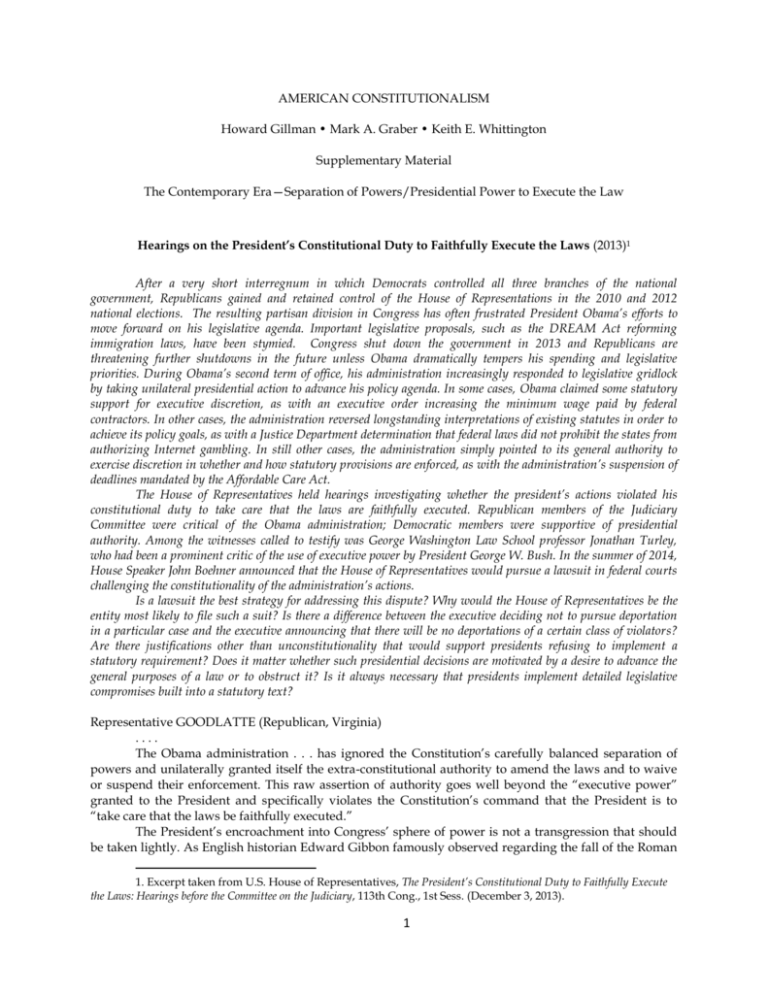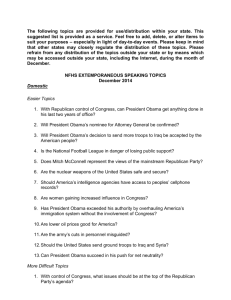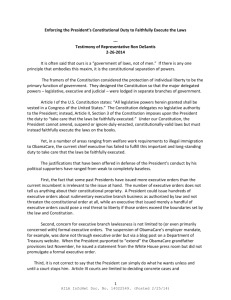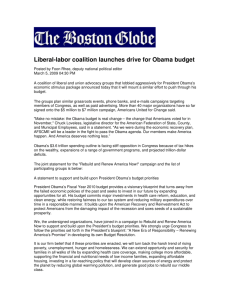Presidents Constitutional Duty Hearings
advertisement

AMERICAN CONSTITUTIONALISM Howard Gillman • Mark A. Graber • Keith E. Whittington Supplementary Material The Contemporary Era—Separation of Powers/Presidential Power to Execute the Law Hearings on the President’s Constitutional Duty to Faithfully Execute the Laws (2013)1 After a very short interregnum in which Democrats controlled all three branches of the national government, Republicans gained and retained control of the House of Representations in the 2010 and 2012 national elections. The resulting partisan division in Congress has often frustrated President Obama’s efforts to move forward on his legislative agenda. Important legislative proposals, such as the DREAM Act reforming immigration laws, have been stymied. Congress shut down the government in 2013 and Republicans are threatening further shutdowns in the future unless Obama dramatically tempers his spending and legislative priorities. During Obama’s second term of office, his administration increasingly responded to legislative gridlock by taking unilateral presidential action to advance his policy agenda. In some cases, Obama claimed some statutory support for executive discretion, as with an executive order increasing the minimum wage paid by federal contractors. In other cases, the administration reversed longstanding interpretations of existing statutes in order to achieve its policy goals, as with a Justice Department determination that federal laws did not prohibit the states from authorizing Internet gambling. In still other cases, the administration simply pointed to its general authority to exercise discretion in whether and how statutory provisions are enforced, as with the administration’s suspension of deadlines mandated by the Affordable Care Act. The House of Representatives held hearings investigating whether the president’s actions violated his constitutional duty to take care that the laws are faithfully executed. Republican members of the Judiciary Committee were critical of the Obama administration; Democratic members were supportive of presidential authority. Among the witnesses called to testify was George Washington Law School professor Jonathan Turley, who had been a prominent critic of the use of executive power by President George W. Bush. In the summer of 2014, House Speaker John Boehner announced that the House of Representatives would pursue a lawsuit in federal courts challenging the constitutionality of the administration’s actions. Is a lawsuit the best strategy for addressing this dispute? Why would the House of Representatives be the entity most likely to file such a suit? Is there a difference between the executive deciding not to pursue deportation in a particular case and the executive announcing that there will be no deportations of a certain class of violators? Are there justifications other than unconstitutionality that would support presidents refusing to implement a statutory requirement? Does it matter whether such presidential decisions are motivated by a desire to advance the general purposes of a law or to obstruct it? Is it always necessary that presidents implement detailed legislative compromises built into a statutory text? Representative GOODLATTE (Republican, Virginia) .... The Obama administration . . . has ignored the Constitution’s carefully balanced separation of powers and unilaterally granted itself the extra-constitutional authority to amend the laws and to waive or suspend their enforcement. This raw assertion of authority goes well beyond the “executive power” granted to the President and specifically violates the Constitution’s command that the President is to “take care that the laws be faithfully executed.” The President’s encroachment into Congress’ sphere of power is not a transgression that should be taken lightly. As English historian Edward Gibbon famously observed regarding the fall of the Roman 1. Excerpt taken from U.S. House of Representatives, The President’s Constitutional Duty to Faithfully Execute the Laws: Hearings before the Committee on the Judiciary, 113th Cong., 1st Sess. (December 3, 2013). 1 Empire, “the principle of a free constitution are irrevocably lost when the legislative power is dominated by the executive.” Although the President’s actions may not yet amount to executive powers overtaking the legislative power, they are certainly undermining the rule of law that is at the center of our constitutional design. From Obamacare to immigration, the current Administration is picking and choosing which laws to enforce. But the Constitution does not confer upon the President the “executive authority” to disregard the separation of powers by unilaterally waiving, suspending, or revising the laws. It is a bedrock principle of constitutional law that the President must “faithfully execute” Acts of Congress. The President cannot refuse to enforce a law simply because he dislikes it. . . . . President Obama is the first President since Richard Nixon to ignore a duly enacted law simply because he disagrees with it. In place of the checks and balances established by the Constitution, President Obama has proclaimed that, “I refuse to take no for an answer,” and that “where Congress won’t act, I will.” Throughout the Obama presidency we have seen a pattern: President Obama circumvents Congress when he does not get his way. For instance, while Congress is currently debating how to reform our immigration laws, the President effectively enacted the DREAM Act himself by ordering immigration officials to stop enforcing immigration laws against certain unlawful immigrants. When he could not get his preferred changes to the No Child Left Behind education law, he unilaterally waived its testing accountability provisions. When he objected to the work requirements in the bipartisan welfare reform law, he granted waivers that are specifically forbidden by the statutory text. Instead of working with Congress to amend Federal drug enforcement policy, he has instructed prosecutors to stop enforcing certain drug laws in certain States and mandatory minimum sentences for certain offenses. And most notably, the President has – without statutory authorization – waived, suspended, and amended several major provisions of his health care law. These unlawful modifications to Obamacare include: delaying for 1 year Obamacare’s employer mandate; instructing States that they are free to ignore the law’s clear language regarding which existing health care plans may be grandfathered; and promulgating an IRS rule that allows for the distribution of billions of dollars in Obamacare subsidies that Congress never authorized. . . . . The President’s far-reaching claims of executive power, if left unchecked, will vest the President with broad domestic policy authority that the Constitution does not grant him. .... Representative CONYERS (Democrat, Michigan) .... The President’s constitutional duty to faithfully execute the laws would be an important issue worthy of a hearing by the Committee if there was any evidence that the President has, indeed, failed to fulfill his duty. But, unfortunately, it appears that some here view policy disagreements as constitutional crises and proof of possible wrongdoing. The fact is that disagreements or even allegations that a program is not being carried out the way Congress intended should not raise constitutional concerns. .... To begin with, some of the Administration’s actions criticized by the majority are not really that much out of the ordinary. Allowing flexibility in the implementation of a new program, even where the statute mandates a specific deadline, is neither unusual nor a constitutional violation. It is, rather, the reality of administering sometimes complex programs. .... Taking steps to deal with the realities of implementation of a complex program hardly constitutes a failure to take care that the laws are faithfully executed. It is, rather, part and parcel of doing just that. There have been Administrations in the past that have obstructed the implementation of laws they opposed, but no one is seriously contending that President Obama opposes the Affordable Care Act, 2 “Obamacare,” or that his Administration’s actions constitute intentional obstruction of the law. . . . [C]ritics of President Obama and his signature legislation allege a constitutional crisis, but no court has ever found delay in implementation of a complex law to constitute a violation of the Take Care Clause. .... Jonathan TURLEY .... . . . . [I]n a Madisonian system, it is often more important how you do something than what you do. We have long benefited from a system designed to channel and transform factional interests in the political system. When any branch encroaches upon the authority of another, it not only introduces instability into the system but leaves political issues raw and unresolved. . . . . . . . There is ample room given to a president in setting priorities in the enforcement of laws. A president is not required to enforce all laws equally or dedicate the same resources to every federal program. Even with this ample allowance, however, I believe that President Barack Obama has crossed the constitutional line between discretionary enforcement and defiance of federal law. . . . All citizens – Democratic or Republican or Independent – should consider the inherent danger presented by a President who can unilaterally suspend laws as a matter of presidential license. .... . . . . One of the most striking aspects of the recent controversies involving presidential nonenforcement is that they involved matters that were either previously before Congress or actually under consideration when President Obama acted unilaterally. .... From Internet gambling to educational waivers to immigration deportations to health care decisions, the Obama Administration has been unilaterally ordering major changes in federal law with the notable exclusion of Congress. Many of these changes have been defended as discretionary acts or mere interpretations of existing law. However, they fit an undeniable pattern of circumventing Congress in the creation of new major standards, exceptions, or outright nullifications. What is most striking about these areas is that they are precisely the type of controversial questions designed for the open and deliberative legislative process. The unilateral imposition of new rules robs the system of its stabilizing characteristics in dealing with factional divisions. While Attorney General Eric Holder has recognized that the judicial branch is “the final arbiter of . . . constitutional claims,” he appears less committed to the concept of the legislative branch’s inherent authority. . . . .... While political divisions would normally be a reason to leave a matter to the legislative process to resolve, it is increasingly being cited as a rationale for circumventing Congress. Thus, citing gridlock and the failure to correct the law, President Obama has granted widespread waivers to states under the No Child Left Behind Act, effectively nullifying the law in the view of critics. . . . The new system is entirely the product of intrabranch process in circumvention of Congress. . . . .... The Administration again circumvented Congress in August of this year with the announcement that deportation would no longer occur for any primary provider for any minor child or the parent or guardian of a child who is a U.S. citizen or legal permanent resident. . . . In ordering this blanked exception, President Obama was nullifying part of a law that he simply disagreed with. There is no claim of unconstitutionality. It is a raw example of the use of the “dispensing power” over federal law. It is difficult to discern any definition of the faithful execution of the laws that would include the blanket suspension or nullification of key provisions. What the immigration order reflects is a policy disagreement with Congress. However, the time and place for such disagreements is found in the legislative process before enactment. If a president can claim sweeping discretion to suspend key federal laws, the entire legislative process becomes little more than a pretense. What is most striking is the willingness of some to accept this transparent effort to rewrite the immigration law after the failure to pass the DREAM Act containing some of the same reforms. .... 3









